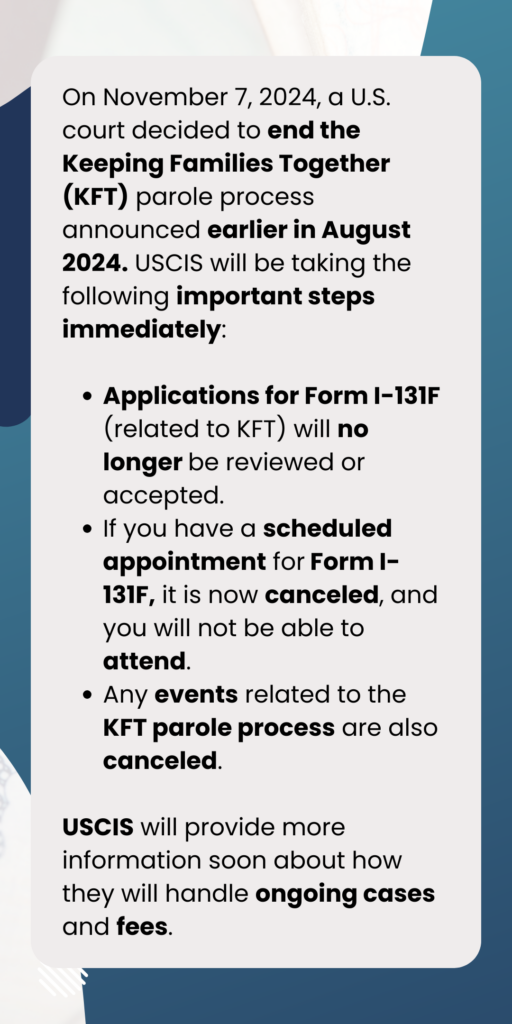On June 18, 2024, President Biden announced new steps to help certain undocumented individuals in the U.S. This guide aims to be helpful whether you're directly affected by immigration policy changes or curious about them. Let's explore what this means for you in more detail.
Discover DHS’s Latest Program Updates in the Federal Register—Check It Out!

Understanding the Biden Administration’s Approach
The Biden administration aims to overhaul immigration with new Parole in Place policy and DACA actions, reversing strict policies. Expanding PIP shows a commitment to keeping families together during tough times.
The updated Parole in Place policy is part of a larger immigration reform effort, addressing a complex issue affecting millions. Reform means more than policy changes; it's about creating a fair, humane system that reflects national values and recognizes immigrants' contributions.
People seen as dangerous won't qualify for this process and could be detained or sent away. The updated immigration Parole in Place policy changes want to unite families but also support the government's goal of keeping the country safe.
The Updated Parole in Place Policy Explained
PIP began for U.S. military families under Bush. Parole in Place has been the biggest help for undocumented immigrants since the 1986 law that legalized 2.7 million people.
The updated "Parole in Place" policy (PIP) helps undocumented people who are married to U.S. citizens and have lived in the United States for at least ten years by June 17, 2024. It gives them legal status to work and protects them from being sent out of the U.S. while they apply to change their immigration status.
The latest Parole in Place policy changes allow people to apply for green cards and later become U.S. citizens without leaving the U.S. This is different from current rules that usually make people return to their home U.S. to try to become legal residents.
Eligibility for Parole-in-Place
Please note Parole in Place policy eligibility is decided on a case-by-case basis, and applications will undergo thorough background checks to ensure security and compliance.
- Noncitizen spouses of U.S. citizens.
- Must have lived in the U.S. for at least 10 years by June 17, 2024.
- Cannot be a danger to public safety or national security.
- Must be married to a U.S. citizen under the law by June 17, 2024.
- Must not have a serious criminal history.
- Noncitizen children of eligible spouses can apply if they are in the U.S. and have a stepchild relationship with a U.S. citizen by June 17, 2024.
Parole in Place Application Process
- Submit an online application to USCIS using the I-131F form with supporting documents.
- Pay the required filing fee of $580.
- USCIS will review each application on a case-by-case basis.
- Factors considered include immigration history, criminal history, and background checks.
- Measures are in place to prevent fraud.
Who Will the Updated Parole-in-Place Policy Benefit?
DHS estimates that 765,000 people married to U.S. citizens don’t have legal status. They’ve lived in the U.S. for about 20 years and have over 1.6 million U.S. citizen children. This is a chance for all eligible individuals to get a Green Card without leaving the U.S.
It's not just about rules but also human rights, helping families who worry about being separated and sent away. This helps families stay together and participate more in society and the economy.
What Are the Key Benefits of the Updated Parole in Place Policy?
- If you meet these criteria, the government might give you parole.
- You would be given parole for three years and might also get permission to work for up to three years.
- If you get parole, you can apply for your green card within three years of approval.
- You can eventually become a U.S. citizen without returning to your home U.S.
Tips for a Successful Application
First, learn about the Parole in Place policy. Get to know the general application process requirements. Then, prepare a strong application. Gather all your documents and make sure everything is correct. Here are some tips:
- Make sure you meet the requirements.
- Gather all the necessary documents.
- Be accurate.
- Get legal help.
- Be patient.
A good application is crucial for immigration. It shows you qualify for Parole in Place. Start by understanding the Parole in Place policy requirements and ensuring you meet them. Gather all required documents, like proof of relationship or your qualifications. Make sure your application is complete and accurate to avoid delays.
Don't be tricked by anyone who promises quick results or special fixes to take your money. If you’re unsure about someone's qualifications, ask for proof and keep a copy. The Parole in Place policy program might face legal challenges affecting its operation, so having a qualified attorney by your side is crucial.
Here’s What You Need to Know About Applying Through USCIS:
The following information was provided by USCIS:
- Right now, USCIS is accepting Form I-131F online applications.
- USCIS officially commended accepting applications as of August 19, 2024.
Important Key Documents to Apply for Parole in Place
USCIS has released an official document filing guide to help with the application process. Below are a list of key required documents:
- Proof that you’re legally married to a U.S. citizen by June 17, 2024 (like a marriage certificate).
- Proof that your spouse is a U.S. citizen, such as their passport or birth certificate.
- Papers that show you’ve been in the U.S. for at least 10 years by June 17, 2024. This could be rent receipts, school or medical records, letters from religious groups, or other official papers.
Important Key Documents If You’re Applying for a Child Who Isn’t a Citizen
- Proof of your relationship with them, like a birth certificate or adoption papers.
- Proof that you were legally married to a U.S. citizen by June 17, 2024.
- Proof that your child has been in the U.S. by June 17, 2024.
@joshisimmigration Breaking Immigration News!
President Biden just announced a new immigration program!

#ImmigrationNews #BidenImmigration #GreenCard #USCIS #ImmigrationLawyer #Biden #DACA #paroleinplace ♬ original sound - Josh Goldstein, Esq.
Frequently Asked Questions
We have put together a list of common questions and answers about Parole and Place, which are currently featured in the latest US immigration news.
1. What is Parole in Place (PIP)?
Parole in Place (PIP) means that sometimes people who come to the United States without permission can stay for a little while because of special humanitarian reasons like needing help urgently or doing something good for the public.
2. What does Parole in Place mean for me?
Parole in Place gives you the legal status and right to stay in the United States for one year at a time and allows you to apply for a work permit
3. Can I apply for a green card after getting Parole in Place?
Yes, you can. You can apply adjustment of status after you’ve received approval for Parole in Place. Speak to a Boston immigration lawyer to help you with the process to change your immigration status.
4. Can I get a driver’s license if I have Parole in Place?
Yes, you can get a driver’s license in certain US states if you have Parole in Place.
5. Does everyone get Parole in Place approval?
No, Parole in place approval is not guaranteed. United States Citizenship and Immigration Services USCIS will review each application and make a decision based on your individual circumstances.
6. What is Biden's parole-in-place policy (PIP) and how does it help?
Biden's PIP policy gives undocumented immigrants married to US citizens temporary legal status and a path to citizenship. It lets them apply for work permits and avoid deportation without leaving the US.
7. Who can benefit from Biden's parole-in-place policy?
This policy helps undocumented immigrants legally married to a US citizen and who have lived in the US for at least 10 years by June 17, 2024. It also includes undocumented children under 21 with a US citizen parent.
8. How many people will the Parole in Place policy help?
About 500,000 spouses of US citizens and 50,000 undocumented children under 21 could benefit from this policy.
9. What does the Parole in Place policy mean for eligible individuals?
Those approved will have three years to apply for permanent residency. They can also work legally during this time.
10. What is the Parole in Place policy’s process for getting permanent residency work?
Successful applicants will get an I-94 travel record, which allows them to change their status to a marriage-based green card holder. This process is expected to be smooth and similar to the military's PIP program.
11. What are the Parole in Place Policy eligibility requirements?
To be eligible, you must be legally married to a US citizen and have lived in the US for at least 10 years by June 17, 2024. Most eligible individuals have lived in the US for an average of 23 years.
12. How can I apply for parole-in-place?
You need to submit an application to US Citizenship and Immigration Services (USCIS). This includes proof of marriage, proof of residency, and other required documents.
13. What documents do I need to apply?
You'll need your marriage certificate, proof of living in the US for at least 10 years, and any other documents that show you meet the requirements.
@joshisimmigration Replying to @TSOPA you missed out on #DACA could you benefit from Biden’s new Immigration program?l, #paroleinplace Yes if you’ve been in the US for 10 years and are married to US citizen and meet other requirements. #mandamus, #immigration, #immigrationlawyer, #greencard, #visa , #visadelay, #somalitiktok, #somali ♬ original sound - Josh Goldstein, Esq.
14. How long does the process of applying for parole in place take?
The process time can vary, but it is expected to be efficient, similar to the military's PIP program. You need to submit your documents and wait for USCIS to approve your application.
15. What happens if my application is denied?
If your application is denied, you can appeal the decision or seek legal advice to explore other immigration options.
16. Can I travel outside the US while on parole-in-place?
Generally, you cannot travel outside the US while on parole-in-place without special permission (advance parole). Check with an immigration lawyer before making any travel plans.
17. How does the Parole in Place policy compare to previous efforts?
Parole-in-place started with the Bush administration for military families. Biden's policy is the biggest expansion for undocumented immigrants since the 1986 amnesty law.
18. How can individuals and families stay informed?
Stay updated on Parole in Place policy changes by following news updates and contacting immigration experts. Get involved in advocacy efforts and seek legal advice when needed.
19. Where can I find more information or get help?
Contact immigration experts or law firms specializing in immigration for personalized guidance and legal help about Biden's parole-in-place policy.
20. What should I do if I think I’m eligible?
If you think you’re eligible, gather your documents and contact an immigration lawyer to help you with the application process.
21. How will the Parole in Place policy impact my family?
This policy can help keep families together by allowing undocumented spouses and children of US citizens to stay in the country legally and apply for permanent residency.
22. Can I get help from an immigration lawyer?
Yes, an immigration lawyer can guide you through the application process, help you gather necessary documents, and provide legal advice.
23. What are the benefits of getting parole-in-place?
Benefits include work authorization, protection from deportation, and a path to apply for a green card and eventually US citizenship.

